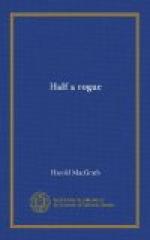“Wait, my beauty; wait. I’ll kill that brother of yours one of these fine days, damn him!” Bolles gave one more look at the swiftly-moving figure on the horse, and shuffled away toward McQuade’s office, to await the arrival of that gentleman. Bolles needed money, and he knew where to get it.
As she reached the foot of Williams Street Patty glanced up the hill. A horseman had just entered Warrington’s. She recognized both man and horse. It was Warrington. She knew at once that he had ridden out her favorite route, perhaps in the hope of seeing her. Her heart tightened strangely as she walked her horse up the hill, and she would have passed home but for the intelligence of her animal, which turned in toward the house quite naturally. Her mother was on the side veranda.
“Patty, you have worried us all. The stableman, when he found your horse gone, came in with the cry of thieves. I was frightened, too, till I went to your room and found you gone. You mustn’t go without notifying the stableman or the groom.”
“It was an impulse of the moment, mother. I couldn’t sleep, and I saw no need of waking up the boys in the stables.”
Patty ran up stairs for a bath and a change of clothes for breakfast. She ate little, however; the ride had not put the usual edge on her appetite.
“Mr. Warrington made a fine speech last night,” said the mother, handing the morning paper to Patty.
Patty accepted it mechanically. She had determined not to read the paper. But she knew now, if she unfolded it, she would turn immediately to the local pages and search for Warrington’s speech. She read it, and she hated herself for admiring it. The self-lie was not among Patty’s failings. There was no denying that Warrington’s speech was a good oratorical effort; every line of it rang sound and true; but that might be a trick of the trade. He could make thieves and villains on the stage speak glibly and plausibly; certainly he could do as much for himself. One thing she could not deny him, and that was frankness. He had confessed to her last summer that he was not, or had not been, a good man in the strict sense of the word. She laid down the paper and finished her coffee. She was glad that she did not have to face Kate at each meal. She felt that she couldn’t have trusted herself; there were times when she spoke the first thought, and always regretted it. Poor John, poor John!
From the table she went directly to the Indian basket that held all the cards and invitations. The mother, concerned with her household duties, left her to herself. Patty would have found some difficulty at that moment in answering any curious questions. One by one she drew out the envelopes and cards. There was a permanent scent of sweet grass. She discovered nothing; she realized that her discovering anything depended solely upon hazard. Excitement ebbed, leaving nothing but hopelessness. She threw the cards and invitations into the basket.




